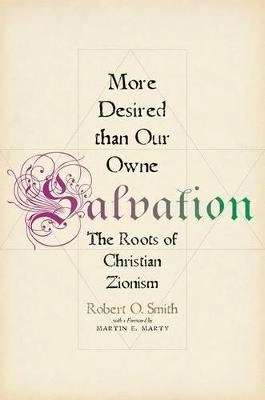Millions of American Christians see U.S. support for the State of Israel as a God-ordained responsibility. Millions more see the ''special relationship'' between the two countries as a bond that should never be challenged, much less broken. Robert O. Smith provides an in-depth look at the English Protestant tradition of Judeo-centric prophecy interpretation at the heart of this popular affinity. In 2006, John Hagee founded Christians United for Israel. Several high-level policymakers, both Christians and Jews, flocked to endorse the effort. Soon, however, questions rose about apparently anti-Catholic and anti-Islamic ideas contained in Hagee's preaching and writing. More Desired Than Our Owne Salvation explores the content of Christian Zionist attitudes, their resonance in popular American culture, and the history of the ideas that have contributed to present realities. After discussing polling data and exploring how Black Protestant views clarify general American attitudes, Smith revisits sixteenth- and seventeenth-century Protestant interpretations of scripture and history. The Pope and the Turk figured significantly, identified by both Luther and Calvin as the two heads of the Antichrist. Protestant exiles from England carried these ideas back to Elizabethan England, provided a nationalist twist, and set Anglo-American history on a new path. The resulting English Protestant tradition of Judeo-centric prophecy interpretation shaped Puritan identity, which was then transferred to New England, where it began informing the foundations of American vocation and self-understanding. Through its developments and adaptations, this Judeo-centric tradition provided English colonists and Anglo Americans with purpose and vision. When the State of Israel was founded in 1948, many Americans readily welcomed it as a prophetic counterpart, a country whose preservation ''may be more desired then our owne salvation.''
Åtkomstkoder och digitalt tilläggsmaterial garanteras inte med begagnade böcker





















